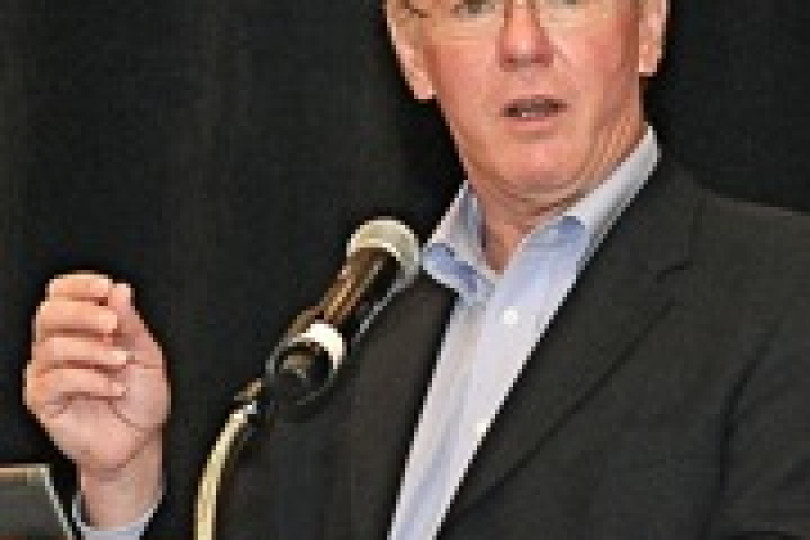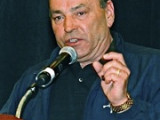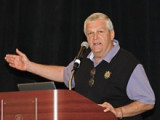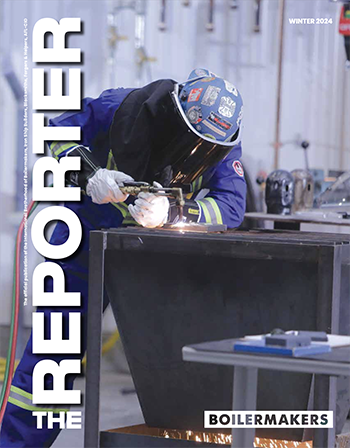Politics and economy frame discussions
UPCOMING NUCLEAR PLANT work, changes to the MOST (Mobilization, Optimization, Safety, and Training) programs, and pension developments were among the key topics addressed at the 2010 Construction Division Conference held at Marco Island, Fla., Mar. 1-4.
“There are going to be a whole lot of Boilermakers retiring in the next few years.”
— IP Newton Jones
Politics and the economy were common threads throughout the annual meeting. International President Newton B. Jones observed that while Congress focused on reforming health care during the past year, other legislation vital to the Boilermakers failed to advance. He cited comprehensive energy policy, pension relief, and the Employee Free Choice Act as areas needing immediate attention.
Jones reminded business managers that a recovering economy and passage of an energy policy could spike demand for more electricity. He said Boilermakers must take the appropriate steps now to be ready for the work that will follow.
“We need to be prepared for when owners start moving forward with more projects — both new and retrofit,” he said. “There are going to be a whole lot of Boilermakers retiring in the next few years. Keep your eye on that and on our apprenticeship program. We’ll also need to maintain a very strong recruiting program.”
Boilermakers rev up for nuclear work
THANKS TO FEDERAL loan guarantees from the Obama administration, new nuclear reactor projects could bring a lot of work to construction Boilermakers, according to John Fultz, Assistant Director for Construction Sector Operations. “We’re going to have Boilermakers on two nuclear sites by the end of 2010,” he told the conference.
Fultz reported that the Building and Construction Trades Department negotiated an agreement with Shaw and the Southern Company to provide skilled union trades for the two reactors that will be added to the Vogtle Electric Generating Plant in Burke County, Ga. Shaw is the general contractor; Southern Company owns and operates the facility. Fultz said the BCTD also negotiated an agreement with Bechtel and Constellation Energy to build a third unit at the Calvert Cliffs Nuclear Power Plant in Maryland.
Site work has already begun on the Vogtle project, and a Boilermaker crew is expected to travel there this summer to begin work on the containment vessel and related items.
Getting in “on the ground floor” with these early nuclear projects is vital, Fultz noted, because the experience and additional training gained by union crews will give them an edge in obtaining new work as other projects develop.
Fultz called on all business managers to share information about nuclear work in their areas. He led a discussion about qualifications and certifications that will be required for work in the nuclear industry. He noted that new units will involve modular construction and that rigging — a Boilermaker specialty — will be an especially important skill set in the newer generation of reactors.
“We’re going to have Boilermakers on two nuclear sites by the end of 2010.”
— AD-CSO John Fultz
“There are a lot of man-hours in these plants for Boilermakers,” Fultz stressed. “They’re smaller crews, but the work is spread out for five years. We’re going after that work hard.”
MOST announces changes to shore up budget
BILL PALMISANO, ADMINISTRATOR of the MOST (Mobilization, Optimization, Safety, and Training) trust, told the construction conference that the organization can no longer sustain all the programs that have been created over the years. He noted that the contributions to the trust have not increased in 10 years, even though the demand for new programs has continued to grow.
To deal with funding shortfalls, several programs were dropped or scaled back in September 2009. MOST no longer pays for the Transportation Worker Identification Credential. The “TWIC card” is required for workers in shipyards and other industrial facilities located in maritime areas of the country as a security measure under the Homeland Security Administration.
Additionally, MOST has dropped its pulmonary function/respiratory fit testing programs in all cases except where Common Arc testing on stainless steel and exotic metals require it.
MOST has also cut in half the number of recruiters — from six to three — and expanded the role of those that remain. Recruiters will now be called Mobilization and Training Representatives (MTRs). “These gentlemen are going to receive every type of certification MOST has to offer,” said Palmisano. “They’ll be utilized across the country when needed in places where an instructor is required, if the local does not have one.”
Other changes involve fees paid by participants during the annual tripartite conference in Myrtle Beach, S.C., each October.
Palmisano said recent negotiations between MOST trustees and NACBE (the National Association of Construction Boilermaker Employers) have increased funding; however, the increases are not enough to preserve all of the MOST programs that had been in place.
“[MOST] remains the best labor-management trust in the United States.”
— MOST Administrator Bill Palmisano
Since 2001, signatory contractors have contributed 24 cents per hour toward MOST (with two cents of that amount going to fund NACBE). The NACBE portion will be reduced to one cent. In addition, contactors will pay an additional five cents an hour toward MOST effective July 1, 2010, and another five cents per hour effective Jan. 1, 2011. An escalator clause tied to the Consumer Price Index will give MOST trustees the option to further increase contributions in the future, if warranted.
“We’ve had to do some things we did not really want to do with MOST,” said Palmisano, referring to scaling back some programs. “But this remains the best labor-management trust in the United States — one that has been widely copied by other trades.”
IP Jones agreed, emphasizing that “MOST is itself a cost-saving program.”
To emphasize the value of MOST, John Erickson, executive administrator of NACBE, estimated that Common Arc welding tests alone saved the utility industry $225 million in 2009, at a cost of just $2.6 million. Meanwhile, the MOST safety program has reduced incidents by 90 percent since its inception.
National funds helped by better returns
POSITIVE INVESTMENT RETURNS for pension, annuity, and health and welfare funds in 2009 offered a reason for some cautious optimism, according to Rich Calcara, executive administrator for the Boilermakers’ national funds office. Calcara said unaudited results for the year showed a return of 18.6 percent for the Boilermaker-Blacksmith National Pension Trust, 17.3 percent for the Boilermakers National Annuity Trust, and 9.9 percent for the Boilermakers National Health and Welfare Fund.
“We’ve got a lot of ground to make up from the negative returns of 2008,” he noted, “but we’re certainly headed in the right direction.”
Tom DelFiacco, vice president of the Segal Co., reported that legislation pending in Congress could help ease the burden faced by multi-employer pension plans in trying to deal with the heavy investment losses due to the stock market collapse. DelFiacco urged business managers to contact Congress and stress how important pension relief is to the Boilermakers. He noted that pension relief legislation had been “placed on the back burner” during debate over health care reform.
DGA eyes mid-term elections, energy policy
DIRECTOR OF POLITICAL Affairs/SAIP Bridget Martin outlined the coming election season and warned of a potential shift in balance away from worker-friendly majorities in Congress. “Democrats have 53 races that are considered competitive or toss-ups,” she said. “Republicans have six. Republicans are certain to pick up three to five governorships. If there is anything that you can take away from today, it’s that there is a perfect storm brewing.”
Martin pointed to two key developments that are fast-approaching: 37 governor races and completion of the new census. She said these events are closely connected, because redistricting will occur after the census, and governors in most states have a major influence in that effort. Conservative governors can redraw district lines to make it easier for anti-union candidates to be elected to the U.S. House of Representatives.
Also on the political front, Director of Legislative Affairs/SAIP Abe Breehey led a three-person panel discussion about a comprehensive energy policy. Breehey was joined by SAIP Tony Jacobs and DTE Enterprise Project Manager Bill Terrasi. Like other important legislation, an energy bill has been held up by health care reform, Breehey said. Jacobs expressed hope that a legislative initiative by Senators Kerry (D-MA), Lieberman (I-CT), and Graham (R-NC) could help speed passage of a workable policy. Terrasi, speaking for Detroit Edison, stressed the importance of reasonable targets and timeframes for owners to meet the goals of greenhouse gas reductions.
After tragedy, Robbins motivates
CONFERENCE PARTICIPANTS heard from NACBE-sponsored motivational speaker Bill Robbins, a double-amputee whose personal tragedy in 1980 led to a career promoting safety. Robbins, who lost both hands after making contact with a 7,200-volt power line, stressed that individuals and organizations need to believe and accept that a goal of zero accidents is attainable. He noted that his own tragedy was entirely preventable.
Robbins related how his accident changed everything — not only for himself, but for his family and everyone else he encounters. He said people react to him differently as a human being when they notice his artificial limbs.
“You don’t want to live in my world,” he stressed, referring to the challenges he has endured. But Robbins has fought through those challenges. In addition to his career as a motivational speaker, he is an author, entrepreneur, and horse breeder.
Boilermaker documentary project wows union leaders
A 20-MINUTE DOCUMENTARY project describing the history of the Boilermakers union and the contributions our members make to society brought conference participants to their feet for a standing ovation. Coordinated by the Boilermaker History Preservation Department (BHPD) and produced by Wide Awake Films, the presentation focuses on how Boilermakers helped build and protect North America through their skills, hard work, and dedication.
BHPD Director Charles A. Jones said the documentary is a work in progress. Its aim is to describe who Boilermakers are and what they do — something people unfamiliar with the Boilermaker trade have difficulty understanding.
A final version of the presentation will be completed at a future date, and local lodges will be notified of its availability.
Prior to the documentary’s viewing, Local 169 BM-ST Bob Hutsell described how the BHPD helped plan and install historic photos and memorabilia in his lodge’s new union hall and training center. In addition, IR Richard MacIntosh provided a visual presentation of Canadian Boilermaker history through a series of old photographs.
Presenters address other issues
CONFERENCE PARTICIPANTS heard presentations on numerous other issues during the week-long meeting.
Brotherhood Bank and Trust — IP Jones announced a resolution by the International Executive Council calling on all local lodges to bank with “our own union bank.” Brotherhood Bank & Trust President Bob McCall and Sr. VP Bill Arnold explained how easy it is for lodges across the country to bank remotely using direct deposit and check scanning.
Referral Rule Changes — Kyle Evenson, ED-CSO/AD-AAIP, and Mark Vandiver, AIP/D-NTDS/AD-CSO, led an open forum on proposed changes to the referral rules and the integration of National Transient Lodge members into construction lodges. Referral rule changes are necessary before the MOST Boilermaker Delivery System can be implemented.
CCS Mountaineer Installation — A first-of-its-kind carbon capture and storage capability at AEP’s Mountaineer plant in West Virginia was the focus of a presentation by D-CDS Dale Branscum, IR Marty Stanton, and Local 667 BM-ST George Pinkerman. The presenters described the specific work done by Boilermakers and considerations for future CCS projects.
Grievances and National Agreements — BCTD-AIP/D-NCA David Haggerty reported on grievances and project labor agreements (PLAs). He stressed the importance of receiving written reports from business managers that explain what was done at every step of the grievance procedure. Haggerty also said he has seen the number of PLAs increase dramatically, thanks to an executive order by Pres. Obama that makes federally-funded projects PLA-eligible.








